Courses of the Cursed is named a finalist in the 15th Annual National Indie Excellence Awards6/4/2021 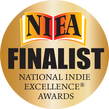 Congratulations to our author Vince Bailey as the second book in his award-winning Curtis Jefferson series was just named as a finalist in the 15th Annual National Indie Excellence Awards. Celebrating excellence in independent publishing, the NIEA named Courses of the Cursed as a finalist in the Regional Fiction category for Southwest-focused fiction. Vince Bailey grew up in central Arizona, starting in the late nineteen-fifties. His youthful experiences there contribute significantly to the nostalgic aspect of his fiction writing. Courses of the Cursed is the second book in the award-winning Curtis Jefferson series. His debut novel, Path of the Half Moon, is the Winner of the Arizona Authors’ Association Literary Award and the Chanticleer International Book Awards for Paranormal and Supernatural Fiction. Courses of the Cursed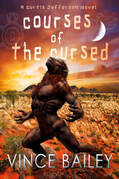 African American youth Curtis Jefferson is still serving his one-year term at Fort Grant, the cursed site of an ancient Native American massacre. In Courses of the Cursed, our hero continues to be challenged by his nemesis, Harvey Huish, while a café owner struggles with a premonition that her nephew will be the victim of a treacherous plot. The parallel stories share a common theme: the curse of Fort Grant. "A rollicking, Western-flavored frightfest. Werewolves and worse haunt the Arizona desert in this supernatural thriller." —Kirkus Reviews Path of the Half Moon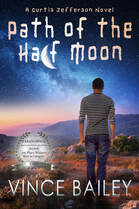 Vince Bailey's award-winning Path of the Half Moon is the first book in the Curtis Jefferson series. Set in a remote detention facility for wayward boys in the early sixties, Curtis is tested by a murderous inmate and a century-old Native American curse. Winner of the CIBA Paranormal Book Awards and the Arizona Authors' Association Literary Award, Path of the Half Moon presents an edgy and thrilling escape from the ordinary. More Praise for the Curtis Jefferson series: Bailey's voice sparkles in this gritty tale about injustice, survival, and the mysterious world of angry ghosts and dark magic. Don't miss it." —Todd Fahnestock (bestselling author of The Wishing World, Fairmist, and Wildmane) "Curtis does what all great storyteller’s do—he creates a suspension of disbelief, granting the listener the right to believe.” —5 Star Rating, Chanticleer Book Reviews Vince has also been published in several college and local newspapers, and for the past ten years he has penned a column for a nationally distributed trade periodical. Mr. Bailey currently resides in Arizona with his family. He's currently working on the next book in the Curtis Jefferson series. Connect with the author at VinceBailey.com
0 Comments
 By guest editor and contributor Macy Cochran Patience is key to publication, and after writing a novel, the dreaded editing process is next, calling for the utmost patience. Writing a novel might sound like the difficult and tedious part of publishing, but isn’t editing your work the most time-consuming part? The editing and revision process is hard on the author and even more trying when beginning the process right after completing your last chapter. All writers need a break from their manuscript, so before taking a nose dive right back into your novel, give yourself a break and allow for time to refresh your creative mind prior to looking upon your manuscript with a pair of fresh eyes.  Some of the best practices for editing your work prior to publication or professional editing can be quick and easy if you take one step at a time. First, read through your manuscript checking for instances where you might “tell” the action instead of “showing” it. Doing a word search for adverbs that end with “ly” is a perfect place to start. The best way to avoid pesky adverbs is to consider the sentence and create a description the adverb was trying to imply. All writers face overused words that always make their way into your work. While editing your own piece, start cutting some of those overused words. Though it might seem time consuming, a quick read-through of your book is what will call attention to any sort of redundancy that’s woven within. Like most authors, we’d like to think our work is a masterpiece that needs no professional editing. The problem is that all authors need editors, and even better––all editors need editors. While you might not catch some awkward phrasing or wordy sentences, an editor is sure to polish those blemishes. Editors can seem intimidating in the beginning because they’re literally hired to find your mistakes. But what might not meet the eye upon first introduction is that working with an editor builds a level of trust. An editor cares for your book as much as you do, and that’s why they chose to work with you.  Working with an editor is often a learning experience. During the time you’re with an editor, you’ll get a better understanding of what kind of editing you need. While developmental editing clears up plot holes and character development, line editing takes care of general syntax issues where grammatical errors tend to appear. Proofreading is almost always a necessity that gives your manuscript a final review for typos and last-minute details prior to publication. But if working with an editor right after the completion of your novel feels too soon, online workshop classes are a timeless means of receiving peer feedback from writers and editors alike. Every author’s opinion is valuable and worth considering. When it comes down to it, editing is likely the most important part of publishing a novel, so track down an editor who’s right for you and your genre and get to work!  Macy Cochran is a freelance editor and writer for the Tryon Daily Bulletin. Learn more about how to work with Macy on her website at ElegantEditingServices.com or by email at [email protected]. Want to know more about working with editors? Check out a previous blog post about working with professional editors: It's your baby, let it grow!
 As the buds are popping brightly and birds are seeking new nesting places, this week’s blog post hopes to inspire our author friends to seek out new followers and uncover potential markets to spring your book into spring! While most authors are hesitant to market themselves and their books, if this is your career, keep in perspective that your book is the product and all products require a marketing and sales strategy . . . no different than any other business. Marketing is an investment in your career. The most important aspect of marketing and promoting your book (outside of knowing your audience) is to engage your audience, fans and readers. You can do this via a variety of platforms, many of which we’ve covered in this year’s blog posts and which we will touch on again here. Who are your readers? In today's digital world, if you want your book to stand out, you're going to have to step up and get involved in the promotion, which often means communicating directly with your target audience through a variety of channels (online and social media, in-person, through print media, etc.). Get to know your audience! Are they working moms, soccer dads, book clubbers, or glamorous literati? What are your readers reading? And what forums do they use to find new books? Use the intelligence you gather to target your marketing efforts and reach out to those segments. Giveaways You can use your established social media presence (even if that’s a Goodreads or Amazon Author Profile) to promote your title. Promotions such as giveaways (available for a fee on Goodreads) are available for FREE on your social media sites. You can setup a giveaway on Instagram or Facebook, for example, by asking your followers to tag your book page (or author page) in a post, follow you, and comment on an Instagram posting. Once they’ve done these things, put their name in a hat and at the end of your giveaway timeframe, send them a direct message and send them their book in exchange for a review on Amazon, Barnes and Noble, and Goodreads. Blogs & Reviews You can work with a blog tour company (TLC Book Tours is one we love) to setup a blog tour for reviewers of your work. If you don’t want to pay a service for this help (which is well worth it, in our view, as you get guaranteed reviews and mentions), you can still compile a list of bloggers and book reviewers and email them asking them if they will review your book in exchange for a free copy. They will then usually post the review of your book on their blog, which has lots of followers – which in turn – can become your followers. As we mentioned in a recent blog post about writing for free, you can also contribute articles to relevant magazines or online blog sites, which is another way you can keep raising your author profile. Find bloggers that will review your book. This can be as simple as googling reviewers based on your genre. Make a list of bloggers that you want to engage for a review and giveaway. For example, here’s a Google search for Historical Fiction Reviewers. Events Publicity, author events, and media appearances can also generate awareness for you as an author and connect you with local readers. At each event, you may want to create a gift basket giveaway, with a signed copy of your book, bookmarks, and other merch, in exchange for collecting email addresses. Building a strong email list is a key component in building your followers and reaching your buyers over time. You may also want to consider hiring a publicist. There are lots of book marketing and publicity firms out there – you just need to take some time and look for local agencies in your area that specialize in book publicity. Here’s a great article by book marketing guru Jane Friedman that helps authors understand what to expect when working with a publicist. Personal Networking
Personal selling can be one of the most persuasive selling tools because it allows two-way communication. Consider the following markets:
If you are not familiar with networking, start with people you know: friends, family, co- workers, alumni, and neighbors. Then move on to less-familiar people. Again, avoid overtly selling to people in your network; instead, ask them for referrals and to spread the word about your book. When personally networking, begin by introducing yourself and mentioning who referred you. Keep in mind that readers want to talk with the author. We talked about creating your own individual social media platforms (Facebook, Goodreads, Instagram, etc.) and through these you can connect with everyone you know. In these posts, you can write about your book, give readers insider information, and even share other titles that you are reading and that inspired you or are of interest to you. Reviews One great asset you have in your personal network is the ability to ask your contacts to provide reviews for online retailers for Amazon, Barnes and Noble, IndieBound, Kobo, iBooks, and Goodreads (or wherever they buy books). If you have professionals and industry experts in your network, offer to give them a book to review in exchange for a free copy. You can also consider paid reviewers such as ForeWord Clarion and Kirkus Indie to get a professional review of your book. Relax and take stock. Most importantly, take a break and take a breath. Building your audience is an experience to enjoy and share. It takes time and patience to build an audience as a new author. Word of mouth is the least cost and most effective way we’ve come across to do this, so keep at it. One reader at a time. Meet Megan Wong, author of YA novel Island Whispers Saturday August 4 at 2 pm at B&N Arboretum7/23/2018 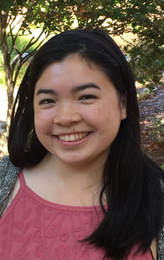 Author Event at The Arboretum Saturday August 4 2:00 pm Eastern Time Barnes and Noble Arboretum 3327 Pineville-Matthews Road Charlotte, NC 28226 Island Whispers Megan Wong will be signing copies of her debut YA novel, Island Whispers. You can also sign up to win a gift basket of Island Whispers merchandise! Megan Wong was always a writer. Beginning in elementary school, she wrote stories and loved reading. As a freshman in high school, she began writing what would become her debut novel, Island Whispers. She loves creating worlds filled with magic and sharing stories that need to be told. She is currently an undergraduate student majoring in psychology with a minor in creative writing at North Carolina State University. Connect with the author on Facebook @islandwhispersmw and follow her blog. Read more about Island Whispers and shop merchandise! Short stories, novellas, and other forms of short fiction are getting a makeover with the prolific access to publishing channels and innovative marketing campaigns. Short stories, the backbone of short fiction, prevails with short story contests and award-winning anthologies. Traditionally defined as stories in length from 1000-4000 words (some go longer, though, up to 20,000), short stories have been the entrée for many an author to get noticed. Many short stories have been adapted into plays, films, and other media. Check out the Goodread's list of all time bests.
The novella, once out of fashion in the publishing world (even though many classic novels, like Animal Farm, Of Mice and Men, and The Metamorphosis, could be considered novellas based on lengths from 20,000 - 50,000) are breathing new life marketed under new names. James Patterson and Harper Collins' recent foray into the short novel - they call them "Book Shots" - focus on short, genre fiction, no more than 150 pages (about 30-40,000 words or so). Released this month, the author's first two releases came out strong with sales of 30,000 copies in the first week or so! These new short novels can be read quickly and feel like watching a film. Expect other publishers to pursue this rebirth of short fiction. They'll be looking for content, content, content...a great opportunity for writers to get in the game. If you want to go even shorter and really flex your word-efficiency, you can write flash fiction - defined as a few hundred words (or shorter). These are fun tidbits from any genre that tell a story or evoke a mood...and can be read in minutes. Read some of the genre's top flash fiction at Flash Fiction Online. You can learn about the format and submit to their literary magazine. At the micro end of the short fiction scale, #twitterfiction, allows writers to create the most creative narrative, tweeting as adopted personas, or tweeting a story from multiple characters' points of view. Check it out if you have a few seconds. Whatever form your short fiction takes, there's a home for it these days. So get in the game...and keep it short! We often get questions from prospective authors about what we will do to market their titles. And while even the best publishing company for new authors has a vested interest in selling books, marketing is truly a team sport. We view marketing as a partnership with our authors, and it really doesn’t work any other way. Many times, authors believe that being published is all you need…but there’s way more to it than that. Yes, publishing companies offer wide and broad distribution, making your title available across the internet, to local retailers, and across the world. But bringing the title to life for your specific readers…garnering your specific following and followers (social media, anyone?)…and spending time developing your own personal brand as an author are key to successfully selling your titles. There are lots of ways to skin this cat and simple keyword searches will lead you to easy-to-use website builders with awesome templates that will allow you quickly put up a simple but effective site. As an author, all you need is a voice – and you already have that. Just remember, simple is best. You may already use social media platforms like Facebook, Twitter, and Pinterest for your personal life. If so, it’s not a big leap to create a second presence for your author persona. Register a new email address, keep the content informative, educational, and personal to you and your unique brand, and you will gain followers. All of this is to say that while a publishing company can and should be helping to sell your titles, it doesn’t work without your committed involvement as an author. So get out there and sing your own praises!
As writers, we've all felt the sting of a form letter, or worse, a personalized rejection from publishing companies or agents. You've put so much work into the best query letter that ever existed on this planet or in the entire universe. And yet, you are met with the cold, hard stare of a rejection like:
I'm not connecting enough with this project. I’m afraid I’ve decided to pass. This is not for me. We do not feel strongly enough about your project to pursue it further. I can only take on projects that spark my passion. If you have been the recipient of anything like this, you are not alone! And in fact, there's a contest designed just for you - the Twitter feed and website www.litrejections.com is holding their first short story contest for fiction with themes about rejection. Oh, irony, how we love thee...find more info here: http://www.litrejections.com/short-story-prize/ And if you don't already follow them on Twitter @LitRejections, you will be glad you did. There is always an inspirational quote or thought for those who persevere! Speed writing tips for today, from some of our favorite writers of both fiction, journalism, and business writing. They work for all. Now keep you foot on the pedal and stay above 55 miles per hour:
Now back on the bus...speed tips are over! There are lots of writing books, classes, blogs, groups, tips and tricks for turning your writing into a career. Many of them include ideas like setting aside a certain time of day for writing, celebrating milestones along the way, and removing pesky distractions while you work. Find the strategies that resonate with you, but remember - YOU are one making and breaking the rules. We've found that if you find what works for you - DO IT. If one day you fall down on the job and watch an entire season of that reality show you've been dying to watch, it's okay. But pick yourself up and begin again the next day on making...and breaking...your own rules.
Visit here to learn more. What we love about the Independent Publishers Book Awards is their commitment to unique categories. Here's a few interesting ones...multicultural fiction, urban fiction, and visionary fiction. All the traditional categories are included, of course, as well as specialized regional and e-book categories. It's a great opportunity to submit something personal to you and be recognized.
|
Archives
June 2024
Categories
All
|
- Welcome
-
Titles
- A Call to China
- Benny Moon: Racing the Medicine Wheel
- Benny Moon Eats Dirt
- Between the Ocean and the Stars
- The Button Collector
- Clown William
- Clown William and the Lincoln County War
- Clown William and the Wind of Vengeance
- The Cornbread Letters
- Crooked Lines
- First Line of Defense
- Highlights of Palmistry
- Hungry
- Indian Country
- Island Whispers
- JuJu Justice
- Ms. Mulligan and the Enchanted Ice Cream
- Mystery Muffin & Soda Pop Slooth: The Legend of Mr. Creepy
- Mystery Muffin & Soda Pop Slooth: The Ghost of Crippler's Creek
- Path of the Half Moon
- Courses of the Cursed
- Merging Paths
- Surrender
- TimeLock
- TimeLock 2: The Kyoto Conspiracy
- The Timestream Verdict
- Whispers on the Wind
- WWCC Heroes
- Submissions
- News & Updates
- Contact
- Bookstore
- Welcome
-
Titles
- A Call to China
- Benny Moon: Racing the Medicine Wheel
- Benny Moon Eats Dirt
- Between the Ocean and the Stars
- The Button Collector
- Clown William
- Clown William and the Lincoln County War
- Clown William and the Wind of Vengeance
- The Cornbread Letters
- Crooked Lines
- First Line of Defense
- Highlights of Palmistry
- Hungry
- Indian Country
- Island Whispers
- JuJu Justice
- Ms. Mulligan and the Enchanted Ice Cream
- Mystery Muffin & Soda Pop Slooth: The Legend of Mr. Creepy
- Mystery Muffin & Soda Pop Slooth: The Ghost of Crippler's Creek
- Path of the Half Moon
- Courses of the Cursed
- Merging Paths
- Surrender
- TimeLock
- TimeLock 2: The Kyoto Conspiracy
- The Timestream Verdict
- Whispers on the Wind
- WWCC Heroes
- Submissions
- News & Updates
- Contact
- Bookstore




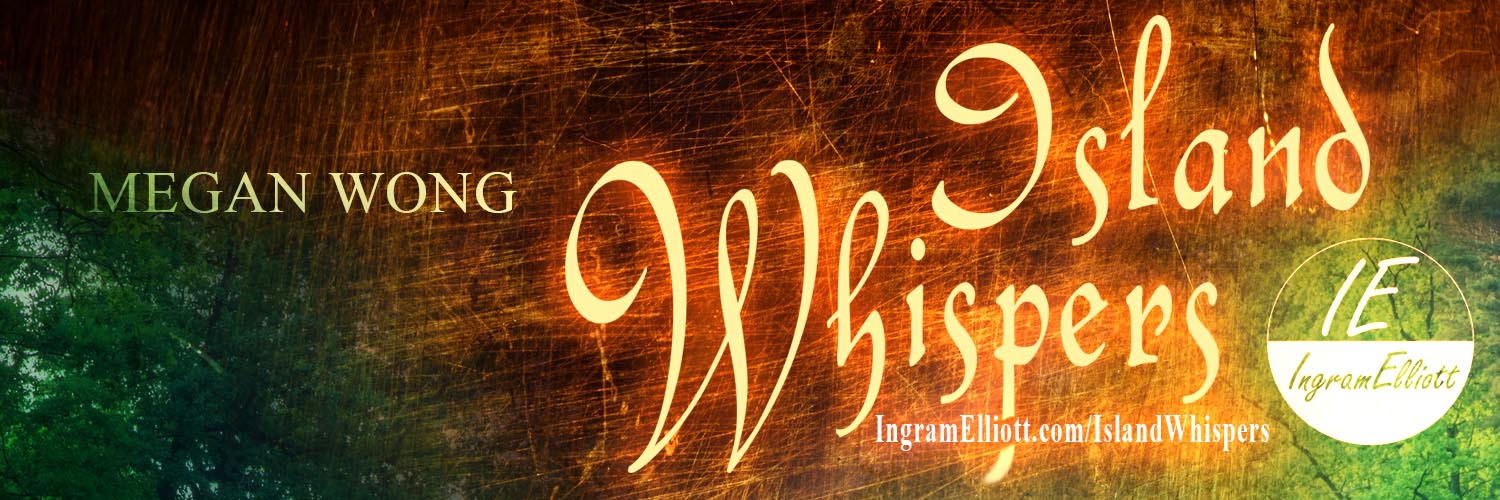

 RSS Feed
RSS Feed

